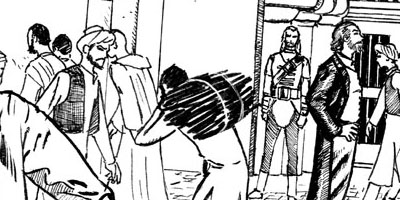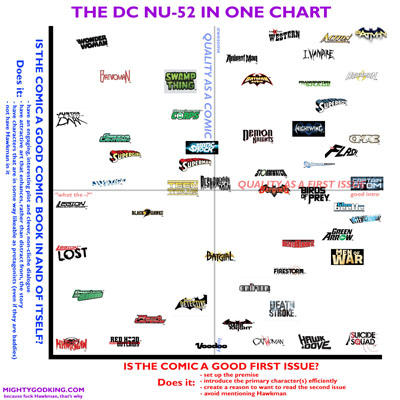Maybe twenty minutes too long, but otherwise manages to make a story that is, at its heart, about statistics filmic in a way that is a deeply impressive piece of writing.
7
Oct
A few years back, I had cause to buy the novelization of ‘Infinite Crisis’, by Greg Cox. (I was working on a book project that has since fallen through on account of being terminally over-ambitious and unfinishable, and it involved reading a lot of crossovers.) I didn’t get around to reading it…see “unfinishable and over-ambitious, terminally”, above…but it’s been sitting on my bookshelf ever since. And because I never get rid of a book I paid money for without reading it, I finally sat down and read the damned thing.
Having read it, let me first say that Greg Cox really does do the best he can with the material he’s given. The prose tends towards functional, but he’s writing the dialogue that was in the original crossover. The plot is labored, with big chunks of the early plot given over to exposition, but that’s unavoidable when you have to write up a single novel that begins where DC had spent two solid years building up to. (The opening prologue, where Martian Manhunter watches the monitors in the Watchtower and recaps the events leading up to IC must have made Cox sweat bullets when he wrote it.) The novel is, I think, the absolute best adaptation of ‘Infinite crisis’ possible.
Sadly, though, reading the story without Phil Jimenez’ wonderful art to distract you, the flaws in the story only become more apparent. Which is a shame, because on paper, the basic idea for ‘Infinite Crisis’ is a wonderful one: All the shit in the DC Universe hits the fan at the exact same time. Every single thing goes wrong at once in a perfect example of the catastrophe curve in action; all the villains in the DC Universe organize into a single gigantic gang, the Spectre goes on a mad rampage, killer cyborgs swarm throughout the world wiping out metahumans, cosmic war threatens to engulf the galaxy, and the three most important heroes can’t stop it because they’ve been pushed to their breaking point. Batman’s lost in his paranoia and has actually helped precipitate events, Wonder Woman has lost the balance between hero and warrior, and Superman no longer knows how to inspire a people lost to despair.
And just when things are at their darkest, these figures from pre-Crisis DC step in and say, “This world is broken. The Crisis created a corrupted, debauched reality. We all know things used to be better. You can feel it. Just let us do what needs doing, and we will create a finer universe, the kind that we used to have.” It feels right, in the middle of all this.
Only then you find out that in fact, they’re the ones who have precipitated all this. The chaos, the darkness, the madness and war are all actually the fault of people so blinded by nostalgia that they’ve become the monsters. They’re so determined to recreate a perfect world that never really existed that they will destroy everything that’s real. The heroes find their way by opposing this madness, and the storm breaks. With the crisis over, Earth can begin to heal.
That’s the idea, of course, but the actual story muddles it. The story insists that no, Luthor did nothing to manipulate the heroes into becoming more brutal, paranoid and anti-heroic (except for the Spectre); Luthor’s statement that this Earth is a fucked-up disaster filled with inferior versions of the real DC heroes goes more or less unchallenged. The reader is left with the distinct feeling that Luthor is entirely right, especially as the Big Three heroes are never really allowed any kind of moment where they overcome their tragic flaws and make things right. (Okay, arguably Batman does, when he blows up Brother Eye. But given that Batman’s decision isn’t just flawed but out-and-out villainous, he needs far more redemption than the other two by that point.) Then, when Luthor actually succeeds at recreating the pre-Crisis multiverse (more or less…ish…kinda…) we’re left with the feeling that he may have been right after all. In the end, it feels like nobody’s right and nothing has been resolved, which is not a good ending to a story even in a comic-book universe where you have to put out another book next month.
As I’ve said before, I really do feel like the story only needs minor changes to make it all work. If the Psycho-Pirate had been revealed to be behind events, manipulating the minds of everyone involved to bring them to the point where he can finally bring back the Multiverse he remembers, I think that it would have taken some of the edge off of the unsympathetic actions of Batman, Superman and Wonder Woman in the story. (As well as resolving some of the major plot holes…can someone really explain to me how Luthor “tricks” General Wade Eiling into working with Captain Nazi, or convinces Black Adam to back Captain Light’s self-righteous “they went too far” act? It all makes a lot more sense if Psycho-Pirate was smoothing things over.)
Even then, the story has flaws; the constant deaths of characters Geoff Johns doesn’t feel are popular enough to survive another crossover aren’t shocking anymore, they’re just irritating. And for all that I’d agree that Superboy-Prime really is the kind of villain who succeeds in making you root like hell against him, he needed his actual comeuppance at the end of the story. Saving him for another crossover was a mistake.
On the whole, I repeat my assertion that this was the best possible ‘Infinite Crisis’ adaptation we could hope for. That’s exactly the problem with it.
7
Oct
My election post-mortem is up at Torontoist, along with the election liveblog from last night.
5
Oct
Torontoist’s provincial election endorsement – most of which I wrote – is up for you to read. It is, perhaps, somewhat predictable, but you have to admit that Torontoist didn’t just let me write “FUCK TIM HUDAK” one thousand times in a row. Which was tempting.
5
Oct
Archie Andrews And The Improver’s Stone
Posted by MGK Published in Archie (Improved Or Otherwise), Comics, Interactive Fun Time Party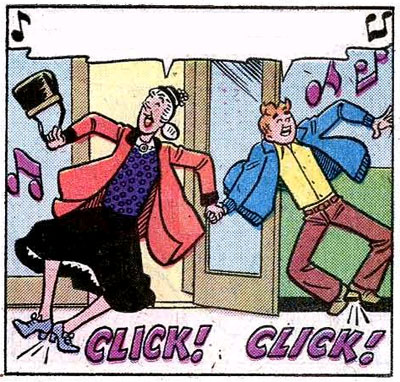
4
Oct
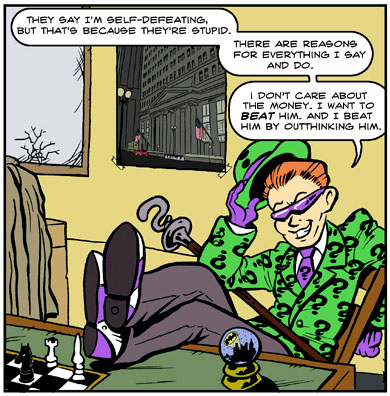
Why, yes, there is a riddle (and an answer) contained within the strip. I mean, how can you do a Riddler introduction without a riddle?
And let’s make it interesting: the first comment to give the exact answer to Riddler’s challenge (which of course demands that you first figure out what it is) will get a prize. And not some crappy “the respect of your peers” prize, either, but an actual comical book from my bookshelf.
Art provided by the extremely talented team of Adam Prosser and Ryan Howe.
UPDATE: Man, you spend the day in hospital for stuff and people just get INVOLVED.
googum came closest first, so I think he is our winner, and he shall receive a copy of American Flagg! vol. 1 by Howard Chaykin – the fancy deluxe hardcover edition Image put out a while back. I’ll put up an answer key/explanation later this week.
3
Oct
My weekly TV column is up at Torontoist.
3
Oct
1
Oct
It is a live cover of dubstep! (Specifically, Skrillex, so you know in advance it’s going to be at least a cover of dubstep that has art to it.)
30
Sep
The One Problem With ‘The Dark Knight’
Posted by John Seavey Published in Film/TV, Flicks, General Nerd Crap, General Nerd ShitWhen ‘The Dark Knight’ came out, I confess that I did not have tremendously high hopes. Not because of Heath Ledger as the Joker or anything I’d heard about the production, but simply because I had yet to see a live-action Batman movie I actually liked after six tries (I liked the ’89 Batman when it came out, but it hasn’t aged well for me.) Even ‘Batman Begins’ holds the distinction of being the one Christopher Nolan movie I haven’t been able to really get behind (its messages about violence strike me as extremely confused. “I won’t kill this man because Killing Is Wrong! And to save him, I’m going to blow up the building with the entire League of Shadows still inside it!”)
But ‘The Dark Knight’ worked. It was, finally, the Batman movie I had been looking for. A brilliant Joker story that made the character convincing, terrifying, and absolutely riveting to watch. A deep, heartfelt exploration of human morality as the Joker works on Gotham City in an effort to prove that given the right circumstances, with the proper motivation, anyone and everyone will become a killer…and fails. Or does he? Seeing Harvey Dent finally snap and prove that at least for him, the Joker was right is a cruel, twisted, but ultimately honest exploration of both characters. It’s a great movie from beginning to almost-end.
Because that’s the one problem with ‘The Dark Knight’. The ending makes no goddamn sense. (I’ll explain why after the cut. Spoilers, sweetie!)
continue reading "The One Problem With ‘The Dark Knight’"
29
Sep
Everything you need to know about the DCU Nu52 – in CHART FORM!
Posted by MGK Published in Comics, Photoshopp'd29
Sep
SUPERMAN #1: Elements of this are interesting, and George Perez both knows how to write dialogue and breakdown a page, and the plot of the book is quite good. But Jesus Merino isn’t George Perez; he’s not even close to being George Perez, and every page with its gorgeous and perfect Perez breakdowns just reinforces for me the fact that Perez isn’t actually drawing the book. Merino is at best competent, and that in turn brings down the book for me. That, plus the stupid Lois/Clark breakup and the stupid Superman de-aging and the stupid stupid stupid new Superman costume, make it hard for me to enjoy this comic: the Superman status quo got fucked up worse than just about every other comic in the nu52 and I find it hard to be enthusiastic.
AQUAMAN #1: This was really quite good – a strong example of what all the #1s should have been. Aquaman gets a dramatic entrance, gets a fight scene, gets some nice character moments, has his powers and backstory introduced efficiently, and the initial threat for the first story arc gets set up. Geoff Johns had to sell Aquaman here, and he managed it expertly. Other than Batman, probably the best of the “Justice League Member” comic #1s. But not the best nu52 of the week.
I, VAMPIRE #1: This is the best nu52 of the week, and I was extremely surprised by that. I wasn’t expecting much out of this, and the epic vampire war comic it in fact turns out to be is goddamn great. It’s moody and bloody and probably completely incapable of coexisting longterm with the DC Universe, what with the fact that the first issue has the evil vampires massacring thousands of people in Boston. But regardless: I enjoyed the hell out of this.
THE SAVAGE HAWKMAN #1: Completely incoherent. I mean, this isn’t just “okay we’re gonna step into the middle of the ongoing run” that some of the other nu52 “no really it’s a reboot” comics like Green Lantern are. This seems to be stepping into the middle of an ongoing comic that didn’t exist before this, and it’s not a good comic either. Hawkman’s new outfit is stupid and ugly. The story is both boring and hard to follow. The dialogue is retarded. The art is confusing. Hawkman is still Hawkman, so I’m not going to pretend that I was coming into this unbiased, because fuck Hawkman, Hawkman sucks. But – I mean, Catwoman and Red Hood may be staggeringly sexist stories, but at least you can sort of read them. The Savage Hawkman, on the other hand, is almost unreadably bad; it’s the Manos, The Hands of Fate of the nu52. It’s so bad, and bad in so many ways that are unexpected, that you just have to kind of stare at it.
VOODOO #1: Now this, on the other hand, is conventionally terrible in the ways we have come to expect from the nu52. Here, I will spoil it for you: ten pages of Voodoo doing sexy stripping, a token action sequence featuring the secret agent lady that isn’t really exciting, and then the other secret agent, for no apparent reason whatsoever, asks Voodoo for a private lapdance and then tells her he is a secret agent keeping an eye on her, so she kills him with alien-shapeshift-claws. There. You now have no reason to read this comic ever. (Wait until Sami Basri illustrates a comic that isn’t a shitburger, because the art shows talent – but still isn’t reason to read this comic.)
JUSTICE LEAGUE DARK #1: Too early to tell. Peter Milligan is going full-bore weird with this book, and when Milligan does that you need to give him two or three issues to figure out what the hell he’s up to. But it’s a nice-looking and readable comic, even with all the weird, so tentative thumbs up.
THE FLASH #1: I remember back when Geoff Johns introduced that Patti character pre-Flashpoint someone complained that he was clearly going to set up a love triangle, and my response was “no, Barry’s married, they have to pull a One More Day to do that,” and then Barry Allen went back in time and annihilated Wally West (or possibly Bart Allen – the jury is still out) from existence so he could have warm fuzzy memories about his dead mother, more or less, and as a result now he and Iris are no longer married so there’s a love triangle. Kudos, guy who said that thing last year! I genuinely could not have called that! Anyway, if you can get past that, this is a perfectly decent superhero comic with gorgeous art from Francis Manapul, but this isn’t anything you’ll remember a year from now.
ALL-STAR WESTERN #1: It’s a Jonah Hex comic by Palmiotti and Gray. You know it’ll do what it says on the tin, and you know it’s gonna be good. Moritat’s art is nice, and a Jonah Hex story set in 1880s Gotham City is an interesting idea. It’s not very Western-y, but eh, whatever. It’s Jonah Hex beating people up and shooting them and stuff. What more do you want, anyway?
THE FURY OF FIRESTORM #1: And Gail Simone goes 0-for-2 with the nu52 so far, which I genuinely could not have guessed would happen, because come on, it’s Gail Simone! But this comic is not very good. The villainous mercenaries (and man, can I just say that the nu52 has so many frigging villainous mercenaries?) are over-the-top, but that is a minor complaint: the problem is that the book goes sharply off the rails at about the two-thirds mark, because before that Ronnie and Jason are normal high school students, but then out of nowhere Jason is privy to the secrets of Firestorm in advance, and then Ronnie and Jason start fighting each other, and the dialogue just starts being not very good (and seriously saying this about a Gail Simone comic is so goddamn weird you guys), and… ugh. This one was a huge disappointment; I was expecting a very good comic and this is not that thing at all.
BATMAN: THE DARK KNIGHT #1: The cliffhanger of this book is Two-Face demanding that now he be called “One-Face.” (Also he is the Hulk, it looks like.) If you need anything more from me to understand that this is a really bad Batman comic, just ask.
BLACKHAWKS #1: This actually managed to entertain me despite some obvious and glaring problems. It doesn’t identify a lot of its characters clearly (or in some cases at all), and in a book with a large cast that’s important. The art is… not very good, frankly, and there are several points where it simply doesn’t mesh with the writing (like where one character complains that a baddie is biting her two panels before he bites her). And of course, the plot point that someone has managed to take a picture of the super-secret Blackhawks would probably make a lot more sense if the super-secret Blackhawks didn’t have Blackhawk insignias on all their planes. But, even with all of that, the comic has a lot of energy to it, and the idea of “G.I. Joe in the DCU” is a pretty good one, and the dialogue is fun and the story okay. I can’t call this a good comic, because it isn’t really good. But it’s fun in a trashy way, and the potential for it to be good is definitely there.
GREEN LANTERN: NEW GUARDIANS #1: So the first half of this comic is… a retelling of Kyle Rayner’s origin? And then it flashes forward? I think? I’m genuinely not entirely sure; the comic doesn’t do anything crazy like label a flashback sequence as being a flashback sequence, or anything like that. Anyway, it then becomes a sort of rote “get the team together” story where they’re all gonna beat up Kyle, more or less. You can skip this, as Larfleeze does not show up anywhere, and what is the point of having the various spectrums of Lanterns if you’re not going to put Larfleeze in the damn comic, I ask you.
28
Sep
1.) I hate to admit that I’m looking forward to the final Wheel of Time book… but I’m looking forward to the final Wheel of Time book. Part of it is that, at times, I am something of a Great Fantasy Moments junkie, much like everyone raised on Tolkien. (“And Morgoth came.” Three little words but they make the entire Silmarillion, which is otherwise at best… shall we say an imperfect work.) I have yet to read Patrick Rothfuss, but otherwise among modern fantasy authors, Jordan and George R.R. Martin are the only epicky fantasy authors who can come anywhere near to the amount of fuckyeah Tolkien could drop down to a single sentence, which is, let’s be honest, a large part of their appeal.
I mean, I get it. I get that Jordan’s writing veers sharply between “a little bit sexist” and “whoa lordy that’s sexist.” I get that there are between two and four books in the middle of it where nothing happens, and that number really only varies by how forgiving you are. I get that Jordan’s allegories are so sheerly clever that sometimes they’re just kind of silly. And did I mention the sexism? Because lordy. But the Wheel of Time has had some truly fantastic moments of fuckyeah: the charge of the heroes in book two, the defense of Emond’s Field in book four, the first attack of the Asha’man in book six, pretty much the whole of book eleven. I can forgive a lot for that.
(And yes, I get that Brandon Sanderson deserves lots of credit for finishing the series off, but I don’t like his other stuff that much.)
2.) Does anybody else ever look at a chain of books by a single author on their shelf and then think “why is that it?” Sometimes it’s self-evident, of course: there aren’t any more Flashman novels because George Macdonald Fraser died, and every time I see my Flashman books I think “can’t wait for the next – oh.” (Granted, every time I see my Flashman books I also think “I really need to get my Flashmans all in the same edition so they look pretty,” but then I realize that that is kind of silly and if I want to give my money away there are poor people in need of soup.)
But Christopher Moore. Why is my Christopher Moore broken up? There are at least three Christopher Moore books I don’t have yet, and I love all his books. Why haven’t I gotten around to reading them? I mean, yes, I always have a pile of books that I’ve bought and yet to read. I’m one of those sorts of people who buy books and then forget to read them: it doesn’t help having the flagship store of an excellent and gigantic used bookstore chain just down the street from me, letting me buy quality books for a few bucks a pop. But this isn’t the “not enough time in your life to read everything that’s worth reading” problem that keeps me from finishing all that Dostoyevsky, or that Complete Robert E. Howard Conan collection, or Everything Is Illuminated1. We’re talking here about books by an author I like and I know I actively want to keep reading. What the hell is up with that?
See also: Walter Mosley, Michael Chabon, Mil Millington, Guy Gavriel Kay.234
And then, of course, there’s P.J. O’Rourke, who I stopped reading when he stopped being funny, which was a long time ago. Which is a shame, because P.J.’s early stuff is fantastic.
3.) Does anybody else have a lot of one-offs? Books by authors you really liked and then felt no need to keep reading that person’s stuff? It’s like the literary equivalent of having that one Beta Band single on your iPod. And Then We Came To The End by Joshua Ferris, Run by Douglas E. Winter, Thank You For Smoking by Christopher Buckley, Jonathan Strange and Mr. Norrell by Susannah Clarke – these are all great books and I’m glad they’re on my shelf and I won’t be getting rid of them any time soon, but I’m not gonna check out those authors’ other works either, and I can’t think of a good reason why.
4.) Why the hell do I still have a copy of How To Lose Friends and Alienate People by Toby Young?
5.) I’m overdue for a culling, obviously, which can be so depressing sometimes. I mean, surely someone will get more love and inspiration from All I Need To Know About Filmmaking I Learned From The Toxic Avenger by Lloyd Kaufman, and it’s just gathering dust, but I don’t want to get rid of it. Those Mick Foley memoirs? Print The Legend, that fantastic John Ford biography? Argh. I know I will never read these books again, but they need to make room for new books. I mean, A Memory of Light is gonna be like sixty billion pages. I’d need to ditch six copies of Best Seat in the House, Spike Lee’s entertaining-but-uneven basketball memoir, in order to make room so that I can find out what the hell happens to Rand Al’Thor.5
I also have trouble culling because one of my favorite types of book is the oddball history – things like Joel Glenn Brunner’s The Emperors of Chocolate or Charlatan by Pope Brock or For All The Tea In China by Sarah Rose. I can never get rid of this sort of book, because I always think “well, there are ideas in here and I am building a weird writer’s reference library and suchlike, it is an asset.” Which means they just accumulate, unceasingly. And I must be fine with this.
- Which I bought either because I really liked the cover or because I saw maybe twenty minutes of the film adaptation and thought “well, I might read the book based on this.” [↩]
- Kay can also do epic fantasy fuckyeah like nobody’s business, but hasn’t really been interested in doing it for years. Which is a shame, because if you’ve read The Fionovar Tapestry you know Kay can bring the fuckyeah. [↩]
- The CBC should spend a lot of money on a miniseries adaptation of those books. [↩]
- Ha! I just suggested that the CBC spend lots of money on something! I’m hilarious! [↩]
- Well, Perrin and Mat, actually. I don’t really care about Rand. Rand is boring. [↩]
27
Sep
My contribution to the Inspector Spacetime secrets Tumblr
Posted by MGK Published in Bad Comedy, General Nerd Crap, TV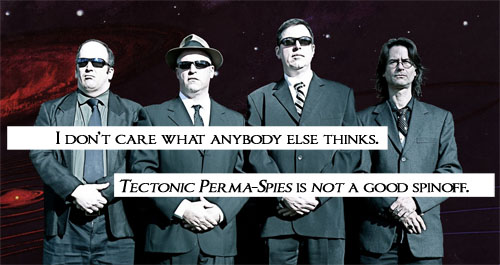
Context. Well, sort of, assuming you watch Community and/or Doctor Who.
(Yeah, yeah, it’s getting time for another “nerdiest post ever” contest…)
27
Sep
This one was actually quite difficult, more difficult than I originally thought it would be, mostly because after I had the idea I realized that I was trying to write an introduction for a character who would never, ever explain themselves, their motives or their ideals. And on top of that, the character is pretty laconic. But he’s still one of my favourites, so I went back to the slate until I had something.
Art provided by the redoubtable Griffin Castro.
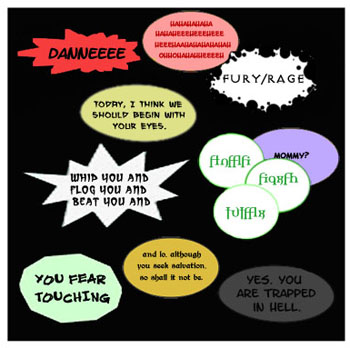
Search
"[O]ne of the funniest bloggers on the planet... I only wish he updated more."
-- Popcrunch.com
"By MightyGodKing, we mean sexiest blog in western civilization."
-- Jenn
Contact
MGKontributors
The Big Board
MGKlassics

Blogroll
- ‘Aqoul
- 4th Letter
- Andrew Wheeler
- Balloon Juice
- Basic Instructions
- Blog@Newsarama
- Cat and Girl
- Chris Butcher
- Colby File
- Comics Should Be Good!
- Creekside
- Dave’s Long Box
- Dead Things On Sticks
- Digby
- Enjoy Every Sandwich
- Ezra Klein
- Fafblog
- Galloping Beaver
- Garth Turner
- House To Astonish
- Howling Curmudgeons
- James Berardinelli
- John Seavey
- Journalista
- Kash Mansori
- Ken Levine
- Kevin Church
- Kevin Drum
- Kung Fu Monkey
- Lawyers, Guns and Money
- Leonard Pierce
- Letterboxd – Christopher Bird - Letterboxd – Christopher Bird
- Little Dee
- Mark Kleiman
- Marmaduke Explained
- My Blahg
- Nobody Scores!
- Norman Wilner
- Nunc Scio
- Obsidian Wings
- Occasional Superheroine
- Pajiba!
- Paul Wells
- Penny Arcade
- Perry Bible Fellowship
- Plastikgyrl
- POGGE
- Progressive Ruin
- sayitwithpie
- scans_daily
- Scary-Go-Round
- Scott Tribe
- Tangible.ca
- The Big Picture
- The Bloggess
- The Comics Reporter
- The Cunning Realist
- The ISB
- The Non-Adventures of Wonderella
- The Savage Critics
- The Superest
- The X-Axis
- Torontoist.com
- Very Good Taste
- We The Robots
- XKCD
- Yirmumah!
Donate
Archives
- August 2023
- May 2022
- January 2022
- May 2021
- January 2021
- December 2020
- October 2020
- June 2020
- March 2020
- January 2020
- December 2019
- October 2019
- February 2019
- January 2019
- December 2018
- April 2018
- March 2018
- February 2018
- January 2018
- December 2017
- November 2017
- October 2017
- February 2017
- January 2017
- December 2016
- November 2016
- October 2016
- September 2016
- August 2016
- July 2016
- June 2016
- May 2016
- April 2016
- March 2016
- February 2016
- January 2016
- December 2015
- November 2015
- October 2015
- September 2015
- August 2015
- July 2015
- June 2015
- May 2015
- April 2015
- March 2015
- February 2015
- January 2015
- December 2014
- November 2014
- October 2014
- September 2014
- August 2014
- July 2014
- June 2014
- May 2014
- April 2014
- March 2014
- February 2014
- January 2014
- December 2013
- November 2013
- October 2013
- September 2013
- August 2013
- July 2013
- June 2013
- May 2013
- April 2013
- March 2013
- February 2013
- January 2013
- December 2012
- November 2012
- October 2012
- September 2012
- August 2012
- July 2012
- June 2012
- May 2012
- April 2012
- March 2012
- February 2012
- January 2012
- December 2011
- November 2011
- October 2011
- September 2011
- August 2011
- July 2011
- June 2011
- May 2011
- April 2011
- March 2011
- February 2011
- January 2011
- December 2010
- November 2010
- October 2010
- September 2010
- August 2010
- July 2010
- June 2010
- May 2010
- April 2010
- March 2010
- February 2010
- January 2010
- December 2009
- November 2009
- October 2009
- September 2009
- August 2009
- July 2009
- June 2009
- May 2009
- April 2009
- March 2009
- February 2009
- January 2009
- December 2008
- November 2008
- October 2008
- September 2008
- August 2008
- July 2008
- June 2008
- May 2008
- April 2008
- March 2008
- February 2008
- January 2008
- December 2007
- November 2007
- October 2007
- September 2007
- August 2007
- July 2007
- February 2007
Tweet Machine
- No Tweets Available
Recent Posts
- Server maintenance for https
- CALL FOR VOTES: the 2021 rec.sport.pro-wrestling Awards
- CALL FOR NOMINATIONS: The 2021 rec.sport.pro-wrestling Awards (the Theszies)
- The 2020 RSPW Awards – RESULTS
- CALL FOR VOTES: the 2020 Theszies (rec.sport.pro-wrestling Awards)
- CALL FOR NOMINATIONS: The 2020 Theszies (rec.sport.pro-wrestling awards)
- given today’s news
- If you can Schumacher it there you can Schumacher it anywhere
- The 2019 RSPW Awards – RESULTS
- CALL FOR VOTES – The 2019 RSPW Awards (The Theszies)
Recent Comments
- George Leonard in When Pogo Met Simple J. Malarkey
- Blob in How Jason Todd Went Wrong A Second Time
- Cindi Chesser in Thursday WHO'S WHO: The War Wheel
- Scott Hater in Bing, Bang, Bing, Fuck Off
- dan loz in Hey, remember how we talked a while a back about b…
- Sean in Server maintenance for https
- Ethan in CALL FOR VOTES: the 2021 rec.sport.pro-wrestling A…
- wyrmsine in ALIGNMENT CHART! Search Engines
- Jeff in CALL FOR VOTES: the 2021 rec.sport.pro-wrestling A…
- Greg in CALL FOR VOTES: the 2021 rec.sport.pro-wrestling A…
